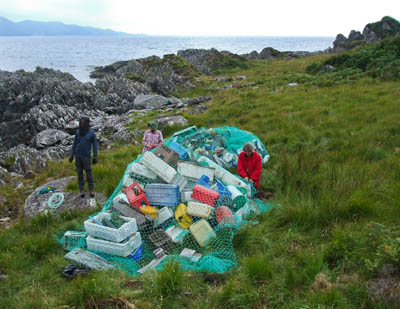 Volunteers cleaning up one of Scotland's most remote areas were astonished to find two boats' hulls among several hundred items of rubbish that filled 300 bags.
Volunteers cleaning up one of Scotland's most remote areas were astonished to find two boats' hulls among several hundred items of rubbish that filled 300 bags.
The Knoydart rubbish collection
The clean-up of a stretch of Knoydart’s beaches also turned up a message in a bottle, a carburettor, a chemical toilet and the remains of a catamaran. A spokesman for the John Muir Trust, which ran the operation jointly with the Friends of Knoydart, said it demonstrated how much rubbish is floating in our seas.
Parties of volunteers have been cleaning up the stretch of coastline between Doune and Sandaig for the last month.
Sandy Maxwell, conservation activities co-ordinator for the John Muir Trust, said: “It is a graphic illustration of just how much marine litter is in the sea. Situated on the south west of the Knoydart Peninsula this stretch of coastline must be a prime catchment area for boat traffic in and around the Minch.”
The Marine Conservation Society estimates beach litter has increased by up to 80 per cent in the last ten years. Each square mile of sea contains an average of 46,000 pieces of plastic, which cause the deaths of more than a million birds and 100,000 sea mammals globally every year, when they ingest or are tangled in the debris.
Mr Maxwell said: “We were absolutely astonished at the sheer scale of rubbish on such a remote spot.”
The list of items collected included: fishing nets, more than 200 fish boxes, a public litter bin, more than 40 oil drums containing discarded marine engine oil, a wheelie bin, a pair of trainers, a broom, two ropes, footballs, hair rollers, half a lemon and a pack of soggy cigars that refused to be lit.
“It is sickening to think that even the most far flung corners of this island are not free from litter and pollution,” said Mr Maxwell. “Leaving the problem to coastal communities to clear up is not the answer. We need to see far stricter management of the seas in the upcoming Marine Bill.”
The collected rubbish will have to be taken from the area by boat – there is no road link to the remote coast on the far western tip of the peninsula, overlooking the Sound of Sleet and Skye. The JMC says it will take at least ten boatloads to clear the waste.
Ranger Tommy McManmon of the Knoydart Foundation expressed gratitude to the volunteers.
He said: “The Knoydart Foundation ranger service is extremely grateful for the hard work and selfless effort put into the beach cleaning by the Friends of Knoydart and John Muir Trust volunteers.
“The area of coastline in question is extremely remote and one of the least visited areas of the peninsula. The clean-up means that a special area will be restored to a condition in which visitors and locals can enjoy a feeling of wildness and solitude.”
The Friends of Knoydart have also donated money to help fund the transport of the rubbish from the site.
Knoydart is described by the foundation as a haven for hillwalkers, mountaineers, sailors, and wildlife enthusiasts and for those who just want to get away from it all for a while. The foundation is a partnership of residents, the Chris Brasher Trust, Highland Council, Kilchoan Estate and the John Muir Trust.
Knoydart has two munros: Ladhar Bheinn and Sgurr na Ciche. The Old Forge Inn, in Inverie, the peninsula’s only village, is reckoned to be Britain’s most remote pub.
The John Muir Trust, named after the Dunbar-born Victorian national park pioneer, describes itself as the UK’s leading wild-land conservation charity. It owns Schiehallion, the Red Cuillin on Skye, Quinag, Sandwood Bay and much of Ben Nevis.
Jon
14 August 2008What about Luinne Bheinn and Meall Buidhe? Are they not Munros any more? [smiley=think]
grough editor
14 August 2008They must have been hiding when we looked. Whoops! Our apologies to these two venerable mountains and all who have climbed them.
R Webb
17 August 2008As if there was anything remotely signifigant about 914.4m - Sgurr na Ciche is not really on Knoydart - as you say, there are a pair of rather lovely hills forgotten. Perhaps they meant hills over another mumbojumbo number 1000m?
Basil Kirchin
15 May 2012What we do to this planet is unforgiveable.
The sooner we become extinct,the better.
Fly Rod Jmc | Ted Williams Fishing Reel
13 October 2015[...] Hair rollers among rubbish netted in Knoydart clean-up – The Knoydart rubbish collection The clean-up of a stretch of … The list of items collected included: fishing nets, more than 200 fish boxes, a public litter bin, more than 40 oil drums containing discarded marine engine oil, a wheelie bin, a pair of … [...]